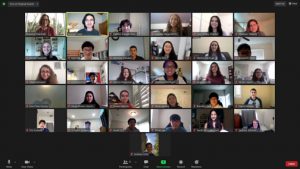
Photo provided by Lori BODNAR
By Lori BODNAR, intern
Twelve Crescenta Valley High School students qualified to attend the California High School Speech Association (CHSSA) state championship and nine students earned the opportunity to compete at the National Speech and Debate Association (NSDA) championship.
This year saw the highest number of CVHS students qualifying for nationals as well as many students qualifying for state. Comparatively, last year one CVHS student qualified for nationals and eight students qualified to attend the state championship.
The CHSSA state championship was held on April 23-25 and the NSDA championship is being held virtually from June 14-19.
The NSDA was created in 1925 to provide recognition and support for students participating in speech and debate activities and is the pinnacle of public speaking. NSDA provides an infrastructure platform to connect, support, and inspire a diverse community committed to empowering students, with their voices heard and celebrated through competitive speech and debate.
Shannon Marshall, the speech and debate teacher and team advisor at CVHS, said, “I’m incredibly proud of our team’s accomplishments this year. But I’m most proud of the camaraderie the group achieved, and the support offered to all of the new members on our team. The incredible leadership of our team coach and CVHS alumnus, Brian Walker, and of our captains and officers made this year incredibly special in spite of all of the challenges.”
The CVHS speech and debate students performed well at the CHSSA championship tournament. Of the 12 CVHS competing students – Eric Eubank, Emily Cha, Connor Eubank, Lucy Rickey, Eran Karmon, Maneh Davityan, Miriam Awan, Madi Valiente, Ellena Kim, Joseph Hyung, Maria Kanayan, and Kyle Pak – three made it to semifinals at the state championship. Karmon earned eighth place in California for impromptu speaking and Connor Eubank placed 11th. Eric Eubank placed 11th in California for Tiktok, a supplemental event this year.
Connor Eubank, the team co-captain, said, “It was a very novel experience; for most of our members it was their first time going to the state tournament and, because of the online format, even for those students who had already been to the state tournament before it was incredibly different. There was really strong competition but our team did super well.
“One of the great parts about state competitions was the fact that we had so many people going, we were able to call each other in-between rounds and swap stories and hype each other up, all of which we’ve missed out on a lot this year because of everything being online.”
Nine of the CVHS speech and debate students will be representing CVHS and California nationally in the National Speech and Debate Association championship. The competing students are Eric Eubank, Connor Eubank, Lucy Rickey, Ellena Kim, Emily Cha, Eran Karmon, Maneh Davityan, Asante Guzik, and Miriam Awan.
Students also competed at the Tournament of Champions (TOC) and National Parliamentary Debate League Tournament of Champions (NPDL TOC), two other national level championship tournaments. Karmon earned 27th place in the entire nation for original oratory speaking at TOC. Rickey and Connor Eubank placed 13th in the nation for parliamentary debate together at NPDL TOC.
In total, CVHS speech and debate team has 35 students.
Most aspects for the team this year – training, practicing and tournaments –was different due to the pandemic restrictions. Rickey, the team co-captain, said, “At the beginning of the school year, the team practices were less dynamic than they had been in the past. Most people would join practices, do what they needed to do, and leave. However, as the year progressed and people spent more time getting to know each other, the social aspect of the team was definitely revived.
“Socializing on the team went from what used to be talking before practices to late night philosophical text conversations, playing video games together, and arguing over politics and the economy. As for tournaments, there were two really big changes; tournaments became more accessible as competitors didn’t have to worry about the expenses of traveling to large invitationals. This opened up a lot of great opportunities, including debating people from Northern California all the way to New York, all of who have different styles than our own. There was a loss of the social aspect of tournaments, especially the part of meeting people in person from various teams. However, the debate community stayed really strong and the team still were able to meet a few amazing debaters that we wouldn’t have had the opportunity to meet if the year had been like normal.”
